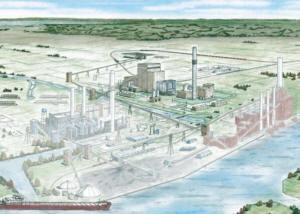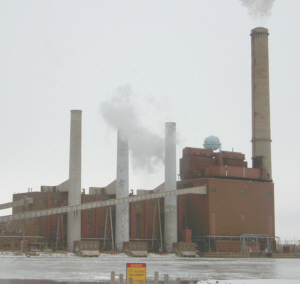Consumers Gets DEQ Air Permit for $2.3 Billion Plant, 5 Old Units to Close
Utility Also Plans to Erect $1.2 Billion in Wind Generators in Thumb
December 29, 2009
By: Dave Rogers

Concept artist's drawing of proposed new Consumers plant (center) shows older Karn-Weadock generating plant facilities in lighter delineation surrounding the new project.

Venerable Karn-Weadock generating plant was dedicated in 1940 with a speech by then Republican Presidential candidate Wendell Willkie.
Consumers Energy today was issued an air permit for the $2 billion-plus project at the Karn-Weadock complex at the mouth of the Saginaw River, Hampton Township.
The approval means Consumers will launch a seven year construction project estimated to put about 1,800 construction workers on the job, add significantly to the local tax base and boost the permanent workforce by at least 100.
The project will continue the recent skein of new developments in the Great Lakes Bay Region that promise to add at least 5,000 jobs and result in about $7 billion in investment.
These projects include:
General Motors Bay City Powertrain work for the Chevy Volt,
Dow Corning's $2 billion Hemlock Semiconductor expansion,
the Dow Chemical deal with Tata Consultants of India that may bring up to 1,450 jobs here,
GlobalWatt solar's $177 million move to Saginaw,
Dow Chemical's solar shingle plant,
the Dow-Kokam battery plant, already under construction at the foot of Midland Road;
Dow monosilane (thin film) plant,
A Dow solar research & development center;
Suniva solar's potential development,
Menlo Logistics move to the Valley Center Technology Park and several others.
The projects come just in time to spark a revival of the region's industry and manufacturing base as the automotive industry contracts.
Under terms of the permit from the Michigan Department of Environmental Quality (DEQ) Consumers had to agree to retire up to seven of its older, less efficient coal units after the new unit begins operating.
A spokesman for the DEQ said taking those seven units, providing 958 megawatts of power, off the grid would significantly reduce carbon emissions. The seven units are located variously at three different plant locations across the state. If the company can prove need in 2017 when the Essexville expansion is on line, two of the units will be allowed to remain in service, according to the DEQ.
The new plant is designed for carbon sequestration (disposing of pollution by pumping it underground) and preliminary research by Western Michigan University shows the area around the plant promising for that method of disposal of gases, according to Consumers.
The next major step for the project is filing a certificate of necessity application with the Michigan Public Service Commission. The company expects to file that application in 2010.
The company said under its Balanced Energy Initiative emissions of noxious chemicals from its generating plants will be reduced by an average of 85 percent in 2018 after the new Essexville plant comes on line.
Five of the older generating units will be retired in 2017 following operation of the new unit, with retirement of the additional two older units dependent on customer need. The utility has the oldest coal plants in the nation with an average age of 50 years.
The 830-megawatt plant is expected to create 1,800 construction jobs, about 2,500 indirect jobs, and then more than 100 permanent jobs after it is operating in 2017. Overall, the plant is projected to provide a $1.2 billion economic boost to Michigan.
"The issuance of the air permit for our new clean coal plant is good news for Michigan. This permit moves our project a step closer to creating badly needed jobs and boosting the state's economy," said John Russell, Consumers Energy's president and chief operating officer.
"It also provides best-in-class protection for the environment with an offset for carbon dioxide emissions from the new plant and a substantial net reduction in overall emissions from our coal-fired generating fleet. It also will allow us to fully implement our balanced energy plan and provide customers with reliable, competitively priced electricity in the future."
The new plant is part of Consumers Energy's Balanced Energy Initiative. That comprehensive plan calls for a portfolio of diverse energy resources to meet the power needs of the utility's 1.8 million electric customers over the next 20 years.
A recent analysis of the plan details how two-thirds of the projected new energy resources needed to serve customers through 2018 will be provided by renewable energy sources, energy efficiency and demand side management (reducing customer usage during peak periods).
The utility launched its energy efficiency initiative in July with programs to help business and residential customers save energy and save money. In its first six months of operation this initiative has benefited more than 170,000 Michigan homes with energy-saving measures.
Consumers Energy plans to invest more than $1.2 billion to build 450 megawatts of wind generating capacity and has secured wind development easements for more than 57,000 acres in Mason, Tuscola and Huron counties. The utility already is the largest supplier of renewable energy in Michigan, with more than 4 percent of the power that it supplies to customers coming from renewable sources.
Russell said the plant retirements are consistent with the company's Balanced Energy Initiative and will substantially reduce overall emissions from the company's coal-fired fleet.
The Balanced Energy Initiative approach -- the new plant plus the eventual retirements of some existing plants and expanded renewable energy and energy efficiency -- is expected to provide emissions reductions by 2018 from the current levels from the company's existing coal fleet.
Emissions are expected to be down as much as 91 percent for sulfur dioxide; 83 percent for nitrogen oxides; and 81 percent for mercury.
"The new coal plant will use state-of-the-art technology and be one of the cleanest coal power plants in the world. We've said all along that building the new unit would have an environmental benefit because it would allow us to retire some of our older units and result in emissions reduction," Russell said.
The new plant will be designed to utilize carbon capture and storage technology once it becomes commercially and economically viable. Consumers Energy has been working with Western Michigan University scientists to evaluate the suitability of the geology surrounding the plant site to store carbon dioxide. Preliminary analysis indicates that the geology surrounding the plant site looks promising for carbon sequestration.
"The certificate of necessity process is new for Michigan and was established in the state's new energy law, put in place last year. With that process, the Michigan Public Service Commission conducts a comprehensive evaluation of the new power plant and evaluates alternatives. It also gives all stakeholders the opportunity to analyze and comment on the project," he said. "This forward-looking regulatory process is one of many public policy improvements made in the state's new energy law."
The Balanced Energy Initiative is a key part of Consumers Energy's Growing Forward strategy, which calls for investing more than $6 billion in the utility over the next five years. That includes significant investments in energy efficiency, renewable energy, environmental and customer service enhancements, and new power generation.
The substantial investments make Consumers Energy one of the largest -- if not the largest -- investor in the state of Michigan. Those investments will help the utility maintain and improve service to customers, create jobs, boost the state's economy, and expand the state's tax base.
Consumers Energy, the principal subsidiary of CMS Energy (NYSE: CMS), provides natural gas and electricity to nearly 6.5 million of Michigan?s 10 million residents in all 68 Lower Peninsula counties.
###